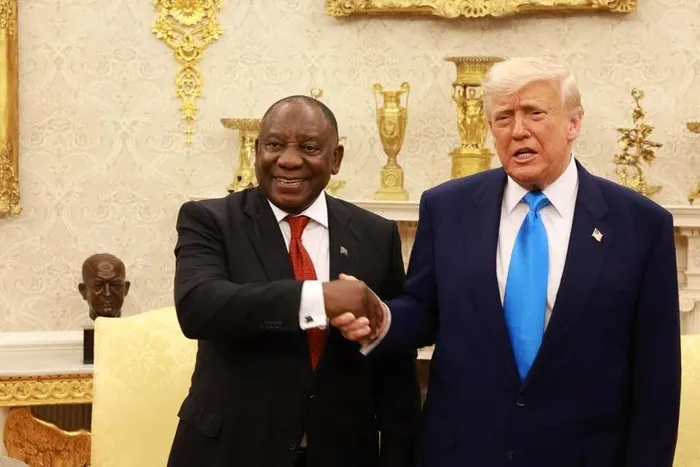SA faces new foreign policy, trade challenges under Trump's administration, warns US expert
GLOBAL TRADE

US President Donald Trump this week slapped South Africa with 30% tariffs on “any and all South African products sent into the United States” from August 1 “to correct the unsustainable trade deficits” against the US.
Image: GCIS
US foreign policy expert Michael Walsh has warned that the 30% tariff imposed on South African imports by the United States was likely the first in a series of actions that will be taken against South Africa by the Trump Administration over the next year.
This comes as US President Donald Trump this week slapped South Africa with 30% tariffs on “any and all South African products sent into the United States” from August 1 “to correct the unsustainable trade deficits” against the US.
Walsh - a non-resident senior fellow at the Foreign Policy Research Institute, an American think tank based in Pennsylvania - said on Wednesday that Trump was going to take more retaliatory actions against South Africa for misalignment with US national security and foreign policy interests before the end of the year.
These actions, according to Walsh, could even include economic sanctions, travel restrictions, visa bans, and counterterrorism investigations.
Walsh said the Trump Administration has made a public commitment to promoting prosperity through reciprocal trade and using economic coercion against those undermining US national security and foreign policy interests.
He said the imposition of an additional ad valorem rate of duty was entirely consistent with following through on those commitments.
“In all likelihood, the Trump Administration is going to take more retaliatory actions against South Africa for misalignment with US national security and foreign policy interests before the end of the year,” Walsh said.
“It will not stop with the new duty, as it did not stop with the foreign assistance ban. It will continue to take such actions until US relations with South Africa mirror US relations with malicious actors. That is the reality.
“Under the Trump Administration, South Africa cannot be friends with Iran and work to undermine the world order with China and expect the US Government to give it a pass. It is not going to happen. This is not the Biden Administration. The Trump Administration is going to put South Africa in the box with adversaries and rivals.”
This comes as Trump has also threatened to charge a 10% tariff on imports from BRICS countries “pretty soon” over the bloc’s “anti-American policies of BRICS” and its persistent push to diminish the US dollar’s dominance as a reserve currency.
"Anybody that's in BRICS is getting a 10% charge pretty soon ... If they're a member of BRICS, they're going to have to pay a 10% tariff ... and they won't be a member long," Trump said.
“BRICS was set up to hurt us, BRICS was set up to degenerate our dollar and take our dollar, take it off as the standard.”
Walsh said what South Africans desperately needed to understand was that the Trump Administration has an internally coherent strategic stance on South Africa that marks a major departure from the last administration.
He said that for the sake of the US-South Africa relations, there needs to be a moment of national reflection in South Africa and that an important lesson therefore needs to be drawn from the foreign assistance and reciprocal trade decisions.
“South Africans may want to think hard about whether their national interests are best served by having their government continue to pursue policies and partnerships that undermine US national security and foreign policy interests. If so, then South Africans should expect the Trump Administration to impose a steep price on South Africans for governmental decisions that undermine US national security and foreign policy interests,” Walsh said.
“We have entered a new era in US-South Africa relations. There is no more business as usual. The status quo is permanently out the window. That should be factored into the South African expectations around Agoa renewal and G20 participation. It should also be factored into the expectations of South African political elites about economic sanctions, travel restrictions, visa bans, and counterterrorism investigations.”
Meanwhile, Everest Wealth Advisory CEO, Thys van Zyl, said the tariff on South African products was a heavy blow to the country’s economy and highlighted how strategic missteps and political uncertainty are undermining South Africa’s international standing.
“What makes this decision even more concerning is that during President Cyril Ramaphosa’s recent visit to the US and meetings in Washington with President Trump, it was clearly indicated that there was still an opportunity to reach an agreement. Yet it seems the government failed to put binding conditions or any protection mechanisms in place in time,” VAn Zyl said.
“We need a proactive trade policy – one driven by results, not rhetoric. The government must now take responsibility for this disastrous diplomatic outcome and immediately put recovery plans on the table to protect the export sector and restore investor confidence.”
BUSINESS REPORT